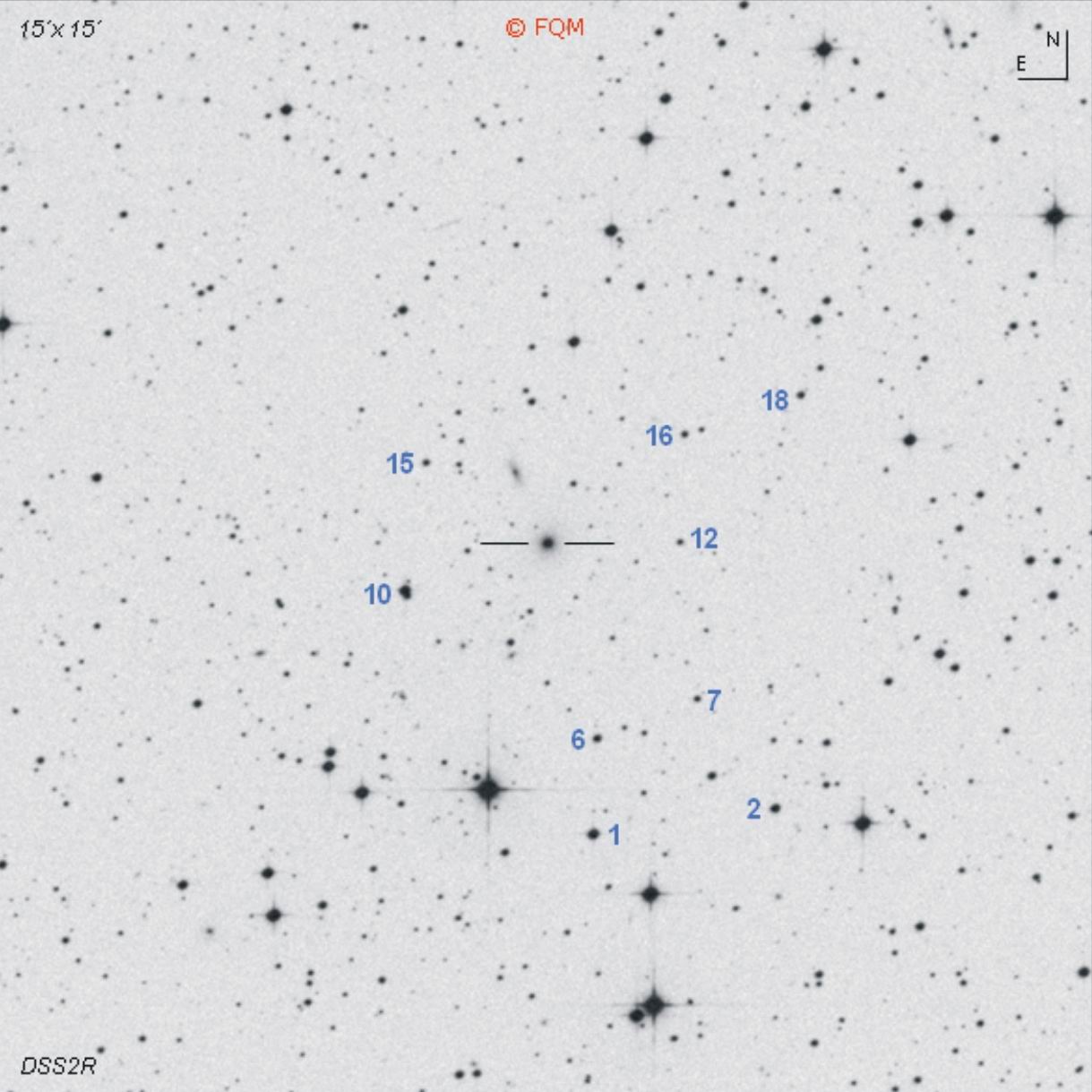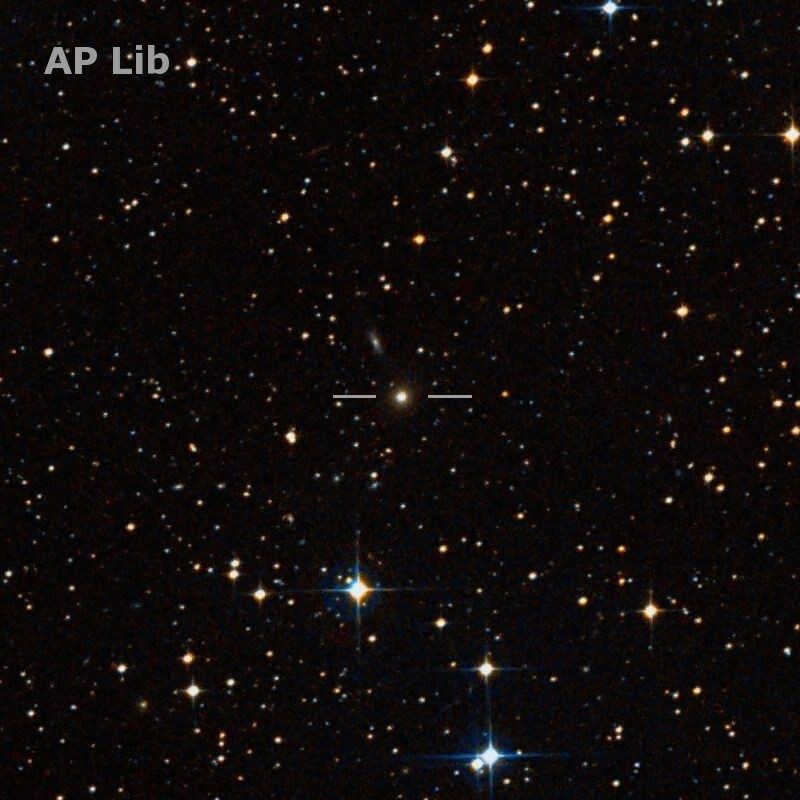
| Frankfurt Quasar Monitoring |
| AP Lib = PKS 1514-24 |
| Cross-Identifications | OR-225, PKS 1514-24, TXS 1514-241, QSO B1514-24 ESO 514-G01, PGC 54592, LEDA 54592, 1514-241 WMAP J1517-2421, 2MASX J15174180-2422192 1E 1514.7-2411, RX J1517.6-2422 |
| Equat. coordinates | RA 15 17 41.8 DE -24 22 20 (J2000) |
| Constellation | Libra |
| Type | BL Lac |
| Redshift (2) | z=0.049 |
| Distance (2) (3) | 202 Mpc |
| Total mag range (mv) (4) | 13.4 - 16.7 |
| Catalog Magnitude (1) | 14.80 |
| Absolute Magnitude (1) | -21.7 MB |
| Light Travel-Time (2) | 0.642 × 109 yrs |

Comparison stars
| star | U | B | V | Rc | Ic |
| 1 | ---- | 14.582
(0.023) |
13.746
(0.003) |
13.277
(0.002) |
12.878
(0.040) |
| 2 | 16.069 (0.100) | 15.583
(0.013) |
14.673
(0.004) |
14.190
(0.014) |
13.805
(0.023) |
| 6 | ---- | 16.598
(0.069) |
15.555
(0.033) |
14.870
(0.020) |
14.281
(0.024) |
| 7 | 17.487 (0.369) | 17.427
(0.048) |
16.387
(0.017) |
15.789
(0.011) |
15.267
(0.028) |
| 10 | 14.850 (0.037) | 14.527
(0.020) |
13.647
(0.003) |
13.095
(0.033) |
12.637
(0.067) |
| 12 | ---- | 17.919
(0.189) |
17.221
(0.047) |
16.084
(0.030) |
---- |
| 15 | 16.402 (0.148) | 16.831
(0.031) |
16.059
(0.027) |
15.613
(0.028) |
15.212
(0.026) |
| 16 | 16.760 (0.199) | 16.991
(0.033) |
16.210
(0.014) |
15.680
(0.020) |
15.211
(0.036) |
| 18 | ---- | 16.523
(0.068) |
15.805
(0.021) |
15.277
(0.015) |
14.914
(0.038) |


| AP
Lib = PKS 1514-24 is a variable BL Lacertae object in southern Libra,
some 3° NE of Sigma Librae. The designation AP Lib indicates that this
object was initially
discovered as a variable star. Indeed, Martha Ashbrook from Harvard
College Observatory discovered this variable object in
1942.
She
recognized
this object due to its optical variability on Harvard photographic
plates, taken between 1935 and 1942. This new variable was designated
AP Lib, and was later included in the GCVS. At the position of AP Lib, a flat spectrum radio source
was detected during Parkes Radio
Survey in 1965, and soon identified with an elliptical galaxy, that shows an apparent
diameter of 0.5´×
0.4´.
In 1971, this elliptical was matched with AP Lib. The host of AP Lib was classified as an N-galaxy by spectroscopy. Despite its nearly featureless spectrum, a redshift was determined in 1974. Based on the flux variability and the optical polarization, AP Lib was classified as a BL Lacertae object. The faint lenticular galaxy, only 1`NE, has the same distance as AP Lib and is supposed to be associated with the BL Lac host - possibly triggering the AGN activity of AP Lib due to tidal interaction. AP Lib is a large amplitude variable object with a total range of about 3 magnitudes in the optical. Visual observers need at least a 12- to 14-inch telescope to glimpse this stellar object. Observers using large aperture telescopes with higher power may recognize the object becoming increasingly star-like, a clear sign of the host. For mid-northern observers, this object is of course a challenge due to its southern declination. CCD observers, as well as visual observers, shall use the comparison stars given above. Another sequence was published by the AAVSO. ____________ For
both digital and visual observers please pay attention to two 11mag
elliptical galaxies just about 20´ NE of Ap Lib, NGC 5898 and NGC 5903. The next interesting deep sky object is 3.3° away to the north, NGC 5897, a pretty bright globular cluster of remarkable low concentration (class 11).
Those observers who like to detect more very old quasi-stellar photons may turn
to quasar PKS 1510-08,
another large amplitude variable object at a
distance of
about 3.8×109 light-years,
some 15° north. |
| Ashbrook, M.D. 1942, Harvard Ann., 109, 7; Ninety-nine Variable Stars in Milky Way Field 359. Biraud, F. 1971, Nature 232, 178; Rapid Optical Variability of the Source PKS 1514-24. Bolton, J., Clarke, M.E., Ekers, R.D. 1965, AuJPh, 18, 627; Identification of extragalactic radio sources between declinations -20° and -44°. Bond, H.E. 1971, ApJ, 167, 79; The Optically Variable Radio Source PKS 1514-24 = AP Librae. Disney, M.J., Peterson, B.A., Rodgers, A.W. 1974, ApJ, 194, L79; The redshift and composite nature of AP Librae (PKS 1514-24). Gonzŕlez-Pérez, J.N., et al. 2001, AJ, 122, 2055; Optical and Near-Infrared Calibration of AGN field stars: An All-Sky Network of faint stars calibrated on the Landolt System. Pesce, J.E., Falomo, R., Treves, A. 1994, AJ, 107, 494; Imaging and spectroscopy of galaxies in the fields of five BL Laceratae objects. Pollock, J.T., Pica, A.J., et al. 1979, AJ, 84, 1658; Long-term optical variations of 20 violently variable extragalactic radio sources. Searle, L., Bolton, J. 1968, ApJ, 154, 101L; Redshifts of Fifteen Radio Sources. Steinicke, W.; Extragalactic Objects Discovered as Variable Stars; Umkirch 2000. Véron-Cetty, M.-P., Véron, P. 2001, A&A 374, 92; A Catalogue of Quasars and Active Nuclei: 10th edition. Véron-Cetty, M.-P., Véron, P. 2003, A&A 412, 399; A Catalogue of Quasars and Active Nuclei: 11th edition. Véron-Cetty, M.-P., Véron, P. 2006, A&A 455, 776; A Catalogue of Quasars and Active Nuclei: 12th edition. Véron-Cetty, M.-P., Véron, P. 2010, A&A 518, 10; A Catalogue of Quasars and Active Nuclei: 13th edition. Westerlund, B.E., Wall, J.V. 1969, AJ, 74, 335; Three-color photometry of southern QSO's, radio galaxies, and normal galaxies. |
| Links: Hamburg Quasar Monitoring Chara/PEGA AAVSO |
| home |